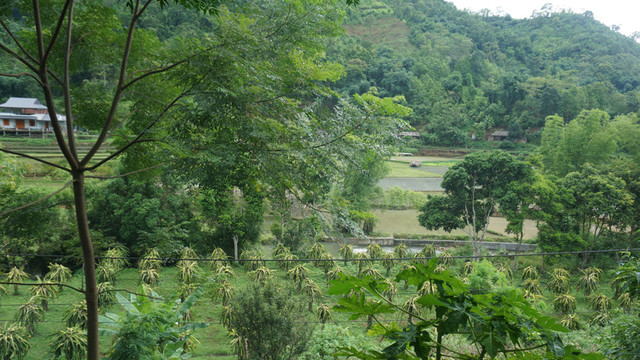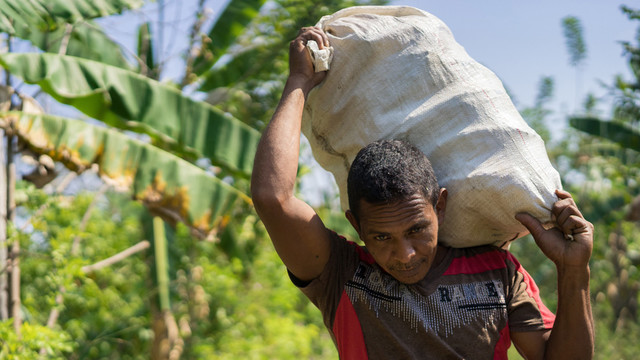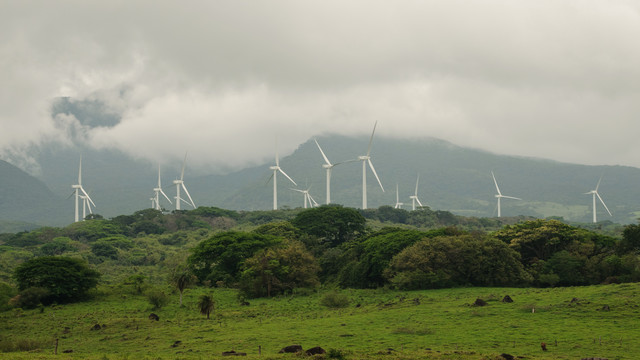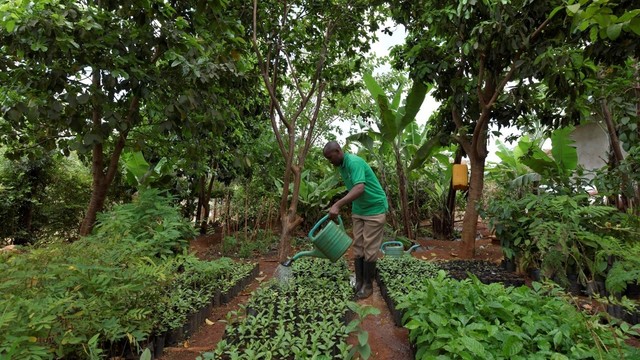Look beyond the trees: the SDGs will have to do more than just 'protect forests'
A United Nations working group has drafted targets to succeed the Millennium Development Goals, which will expire next year. IIED's assessment finds a strong set of targets, but also trade-offs and missing issues.


Lushoto, Tanzania: Farmers are being encouraged to diversify into agroforestry. Here a tree nursery group discusses the challenges and opportunities (Photo: P Kimeli/CCAFS)
What do you see, when you see a forest? If we protect forests, we gain so much more than a dramatic vista.
Forests provide people's livelihoods, their medicine, heating, food and furniture. Forests help stabilise the planet's climate and water cycles, boost green economies through employment, manufacturing and trade, help make communities more resilient against natural disasters, and offer a haven for biodiversity.
This long list of benefits is important to remember as the international community grapples with finalising a set of targets, called the Sustainable Development Goals (SDGs), to be achieved by 2030.
The UN Open Working Group has made a draft proposal for the SDGs, which includes a list of 169 targets across 17 goal areas. Those engaged in negotiating the final goals over the next year need to consider the best framework for forests, yet – if you'll pardon the platitude – many cannot see the wood for the trees.
The bigger picture
IIED has carried out a survey with 300 respondents, consultations with Least Developed Country (LDC) representatives, and regional studies with forest experts. Their key message was that the SDG framework must look beyond purely forests to reinforce those underlying conditions that allow forests to deliver sustainable development outcomes. Read the full report.
Yet policy makers are focusing mostly on the trees. Targets that mention the word 'forest', such as sustainable management of forests, deforestation, forest restoration, afforestation and reforestation, are emphasised. The almost universal support for these issues, especially sustainable management of forests, justifies their inclusion in a well-defined target. But this emphasis risks leaving other vitally important issues to play second fiddle.
An integrated approach that goes beyond forests is the only way to achieve what the UN terms 'transformative' change. A range of other targets are needed to address systemic barriers to sustainability and to create the right conditions for this change. Assessments, consultations and dialogue have revealed the following priority conditions:
- Equitable rights to control, own and access land, property and natural resources
- Inclusive decision-making processes and equal opportunities
- Accountability and transparency
- Support for small enterprises and producer organisations, access to markets and product diversification
- Responsible and sustainable private sector practices
- Sustainable agriculture and food systems, and integrated water management
- Negotiated land use planning
- Broader measures of progress beyond Gross Domestic Product in national accounting, and
- Resourcing, incentives, knowledge and coordination to underpin the above.
These are the areas that forest experts, policymakers and negotiators need to ensure are properly framed in the final Sustainable Development Goals. They are also the issues that local stakeholders want to be right because they are among the conditions that enable locally-controlled forestry, which is known to deliver better development outcomes.
Building on the momentum
Overall, the UN's 17-month Open Working Group process from March 2013 to July 2014 appears to have been both inclusive and open, with negotiators responding to calls to improve the proposals for forests and related themes.
Indeed, this group's proposal for SDGs, released in July, includes various advances. Forests are now mentioned in Goal 15, as is forest restoration and afforestation, alongside sustainable management, reforestation and halting deforestation. We see equal control for men and women listed as an aim alongside rights, access and ownership with regards to land, property and natural resources, and we see recognition of indigenous peoples.
Sustainable food production systems are now mentioned alongside resilient agricultural practices. The need for integrated water resource management is reflected through the inclusion of sustainable management of water, habitat restoration (including for forests), and local community participation.
Room for improvement
For all this progress, there is more to be done. The IIED report shows how most of the priority enabling conditions mentioned above are covered by around 25 targets within the UN's final draft — but that not all have made the cut.
We found land use planning which should emphasise stakeholders' ability to effectively engage and negotiate a fair outcome), and strengthened forest and farm producer organisations (which can provide many benefits through collective action) are two priorities that do not yet feature in the proposed SDGs.
A stronger commitment to recognise the role that commercial agriculture plays in driving deforestation is also required, in the form of an ambitious target to stop agricultural commodities driving deforestation and ecosystem loss.
With the current proposal totalling 169 targets, realistically measuring progress seems unlikely. Targets will need to be carefully consolidated to ensure greater clarity, without losing those targets important for sustainable forests.
The post-2015 sustainable development framework is not just about eradicating poverty, but also solving global challenges to sustainable development. Forests can play a major role in that vision if we get it right.
Simon Milledge (simon.milledge@iied.org) is a principal researcher within IIED's Natural Resources Group and leads IIED's work on forests.
'Strengthening forest landscapes to score sustainable development goals' will be discussed at the 2014 Global Landscapes Forum in Lima, Peru from 15.45-17.15 on 6 December. Read the event programme and join us.
Read more about IIED's work on forests and the post-2015 development framework.




